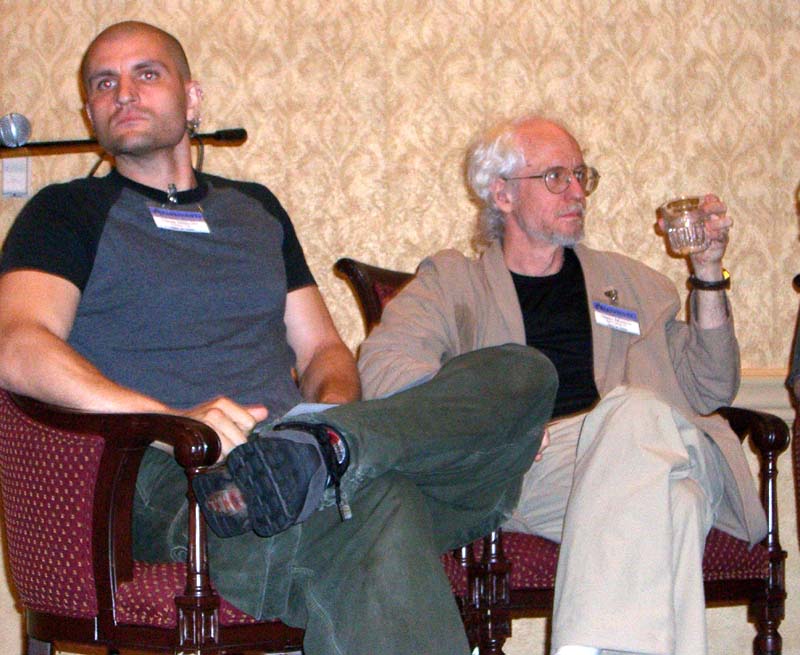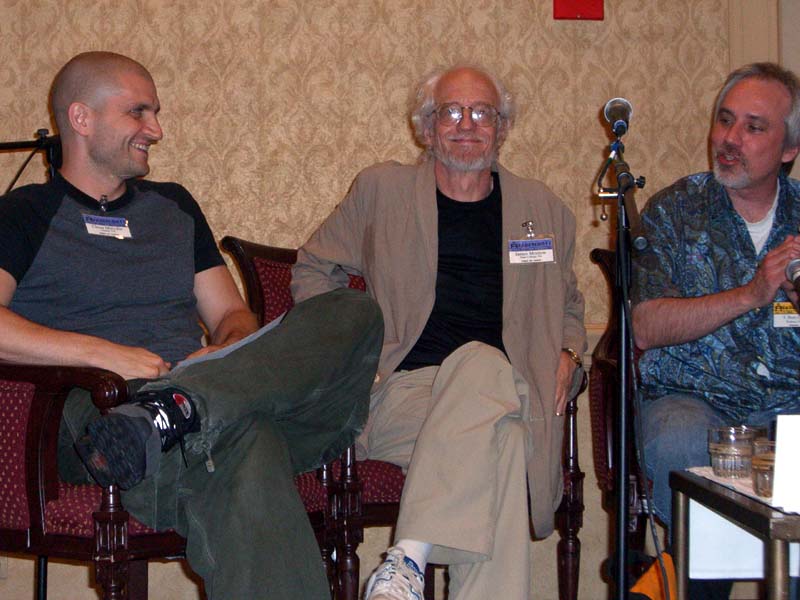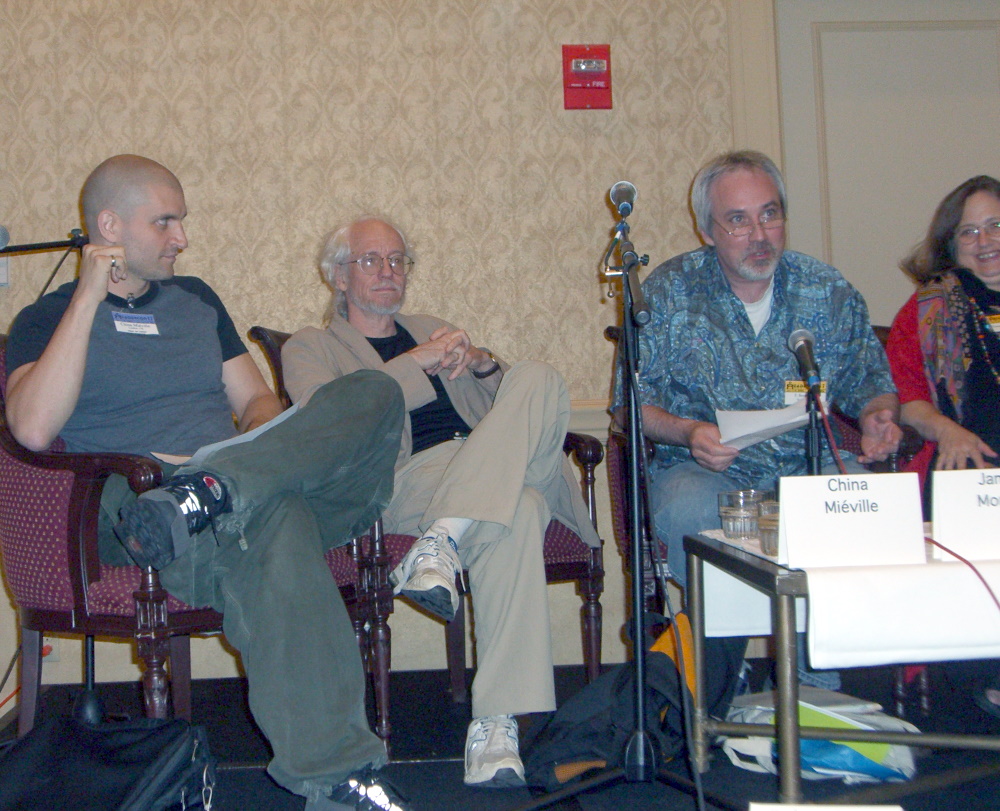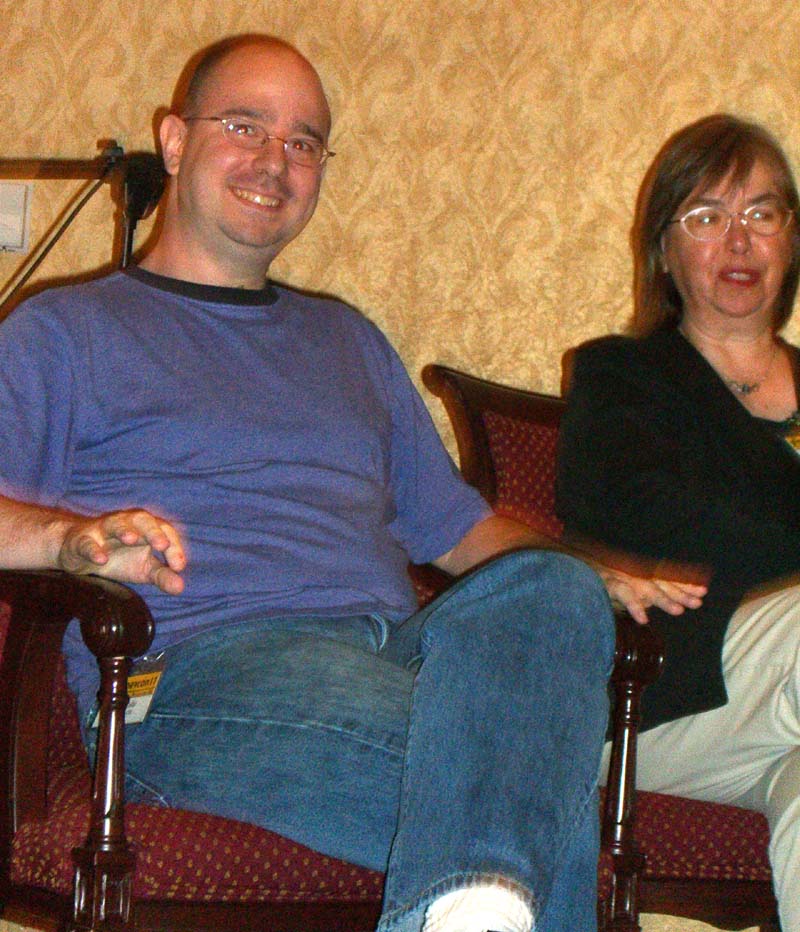Readercon, a science fiction convention in Burlington, MA, July 2006
Readercon is a literary science fiction convention that takes place in Burlington, Massachussets. The guests of honor in 2006 were authors China Mieville and James Morrow.
China Mieville signs books at Readercon

I got my picture taken with China Mieville at his book signing. I brought my copy of Perdido Street Station for him to sign. A volunteer that was managing the line at the signing commented that my book was well worn, and she meant it in a complimentary way, implying that I must have read it many times. I didn’t have the heart to tell her that I’m just rough with books; I had read it exactly once. Most of the reading I’ve been doing in the last couple of decades was while exercising on a stairmaster. My methods for securing books to a piece of exercise equipment leave them looking rather worn.

A guy with checkered hairdo, seen at Readercon

Writer Scott Bakker at the “Fantasy, Neuroscience and the Semantic Apocalypse” panel
I was left not knowing what to make of this panel. On one hand, Scott Bakker (who, as I recall, was the only panelist) was saying things I totally agree with, such as
“A lot of people ratchet up the standard of truth and say science can’t measure up, and I’m not saying science has a monopoly of truth, but it’s better than anything else we have. It’s not that science is perfect; I’m saying that in our society, when it comes to competing claims, science is the only one that has any success in arbitrating between them.”
and also
“Science has substituted anthropomorphic understanding with a mechanical understanding of things.”
but also, things that I don’t think follow from the above. Such as:
“If technological optimists are right and we can reverse environmental destruction, we are going to innovate ourselves out of existence. Why? Once again, because of science.”
Why, indeed? Apparently because people require anthropomorphic understanding of the universe, the kind that religion provides them, and science has eliminated that. It substituted it with a mechanical understanding.
It’s a notion that has been floated around a lot, so much so that it has become a well-worn cliche. I never understood it on a personal level. To me, the wonders of science (for example, discoveries in physics or cosmology) always seemed immensely more interesting and awe-filling than the notion of a god who is enmeshed in people’s petty interpersonal dramas. But let’s say for most people it is the other way around. Even if it is true, I did not hear any new take on this idea in this panel.
The “Semantic apocalypse” in the panel’s title refers to the “possibility that meaning is dead”. Those are Scott’s words. He adds that “there is no such things as meaning. I use meaning as a grab-bag term, because I don’t know what meaning is either.” But he knows that things like morality or motive are parts of this general concept of meaning. And apparently meaning is dead because of science. Science, with its mechanistic explanations of things, has obsoleted “meaning”. That’s what I inferred from his very convoluted speech.
So, to summarize this panel, there was a thesis I agreed with (that scientific process is our only way at getting closer to the truth), and a corollary that I didn’t agree with at all — that replacing anthropomorphic explanations with natural ones deprives people of meaning, whatever it is.
Looking back, I wasn’t sure what to make of the speaker’s unusual manner of expression. His speech sounded like a rant, but full of academic expressions, and sprinkled with self-deprecating jokes about philosophers (he was a philosophy major). The unusual format leads you to think that there will be some novel insights in the speech, but then you don’t find any. And you wonder if it’s just you being imperceptible, or if there really weren’t any.
Oh, and neuroscience, despite being in the title, didn’t get much air time on the panel, but was mentioned towards the end as a big culprit in advancing the apocalypse of meaning. “Neuroscience is picking us apart at supposedly the most fundamental level possible. This experience you all are having that seems rich and incredibly complete and deep, is illusion.” According to Scott Bakker, it is destroying the concept of free will. He cited a book, “The Illusion of Conscious Will” by Daniel M. Wegner, that describes experiments that strongly suggest that the feeling of free will we have is something we attach after the fact. “So how do we make sense of responsibility, of morality, or any agency? will this research lead us back through some circuitous route to confirm our cherished intuitions of selfhood and perceptions of reality and free will?”
I have to say, that IS a good question.

The war of worldviews
The War of Worldviews was a panel that, looking at my notes, I assume was about a conflict between the scientific and religious worldviews. Some people pointed out that our lives are unimaginable without technology, so science seems to have won. “How can we sit in a room with cellphones, computers, etc., and say science doesn’t work, that it’s being destroyed by forces of irrationality?” But not many agreed with that conclusion. Instead, while listening to the panelists’ arguments, I noticed they were mentioning World War I a whole lot.
Some people here kept bringing up World War I as an event that proved that the rational worldview was not all powerful, as it failed to prevent killing of millions of people. And by “some people” I mean mostly China Mieville. According to him, Lovecraft and Tolkien recognized that something went incredibly wrong in the first half of the 20th century. The “something” eventually manifested as the two world wars. Another panelist clarified that it was Virginia Woolf who said that something went wrong with human nature around the year 19??. Perhaps he meant Virginia Woolf quote “On or about December 1910 human character changed” (the source is this New York Times article). Tolkien’s and Lovecraft’s works were two different responses to the disillusionment in human nature that WWI brought. To Lovecraft, the physical reality was “predicated on a monster that destroys them all”. And Tolkien, according to China Mieville, is like a “desperate mean rocking himself and saying “this will be OK”. Tolkien knew something world-shattering has just happened.” (I didn’t quite get his drift, despite having read most of Tolkien’s works. — E.)
Brett Cox agreed that World War I was a turning point, not only smashing our illusions about enlightenment, but also smashing our romantic vision of progress.
Another thing that kept coming up was “Campbellian worldview”. The panelists attacked it mercilessly. Campbellian in this case means a worldview espoused by the famous science fiction editor of the mid-20th century, John W. Campbell, who, according to Wikipedia, helped to shape modern science fiction more than any other individual. As far as what Campbellian worldview really is, I could only piece it together from the snippets of what other people said, not just at Readercon but at other conventions I’ve been to over the years. Campbell, as I heard, only published the kind of science fiction where the good guys and rationality triumphed. That’s probably an oversimplification, but it seemed that it was this kind of naive optimistic view — a belief that science and technology were always the forces for good — that the panelists attacked. Several of them mentioned that the Campbellian worldview did not represent actual rationalist view.
In light of World War I, they said, Campbelian science fiction was nothing more than a post-factum propaganda. “The Campbellians know they are bullshitters and that’s why they are so nervous,” said China Mieville. “To set Campbelian SF as a paradigm of a rational worldview is a misunderstanding,” said another panelist. “The assumption is the Campbellian SF championed rationality; on the other hand, it is hard to read some works of Robert Heinlein and see them as a pure statement of rationality,” said Brett Cox. Others reminded us that Campbell was fond of paranormal phenomena, which casts even more doubt on his presumed rationality.
Some panelists tried to steer the conversation away from attacking the low-hanging fruit, Campbellian SF as a stand-in for rational worldview as a whole. James Morrow said, “All the enlightenment is really saying, things were not optimally arranged from on high. Our institutions are not god-given. So let’s have a great big conversation about it.”
But overall the panel was quite chaotic and the conversation circled around and around without neither agreeing nor disagreeing on something.
Left to right: China Mieville, James Morrow, and Brett Cox at “The War of Worldviews” panel

Left to right: China Mieville, James Morrow, and Brett Cox at “The War of Worldviews” panel

China Mieville, James Morrow, Brett Cox and editor Teresa Nielsen Hayden

China Mieville and Jesse in Readercon hotel hallway

Continuing Evolution
“Continuing Evolution” was another panel where the usual arguments about evolution are rehashed, without much new being said.
Humans started controlling their own evolution in negative way, according to Karl Schroeder, because they permit propagation of negative survival traits. Humans tinkering with human genome is also “messing up the process that doesn’t necessarily need to be messed up”, to quote John Scalzi. And deliberately designing humans for the future is counterproductive / doesn’t work, according to Karl Schroeder, because you can’t anticipate in advance what selection criteria will become. You can’t design a human for the future because you can’t know what the future is going to be. (I don’t see how that’s an argument against designing human bodies that were less prone to illness and injury. — E.)
There was surprisingly little discussion on how directing the human evolution to breed out undesirable physical traits would be nothing but good ole’ eugenics. Luckily, according to Karl Schroeder, we don’t need it, because we have genetic engineering.
In many conventions I noticed it is very common for panelists to talk in circles and debate the definitions of basic terms. Here, for example, someone asked, how do you define a maladaptive trait if with this trait you can still function in the environment? Is poor vision maladaptive if one can wear strong glasses? What about a person who, like one of the panelists (they revealed this about themselves), “can’t see, can’t process calcium, has diabetes and a juvenile onset arthritis”? Those would be seriously maladaptive traits — but, as another panelist pointed out to this individual, h/she IS adjusted to survive in a very specific niche. That niche, I assume, would be a society that lets this person make a living with their brain instead of their body, and that has treatments for their health problems.
Also, as another panelist mentioned, is addiction to alcohol or drugs a maladaptive trait, when a person with those conditions has lots of babies? If they are out-reproducing the high-functioning people, then it is an adaptive trait.
But I’m sure this and other terms have definite meanings in biology, and perhaps this convention panel was lacking an actual expert in the field, who could put an end to the confusion. It is very common for science fiction convention panels to lack experts in the scientific field they are discussing, and that’s a shame, because such an expert could actually move the conversation forward.
Left: Jeff Hecht — in his own words, primarily a science writer who also writes science fiction. Right: science fiction author Karl Schroeder.

Science fiction author John Scalzi and editor Beth Meacham
